Key takeaways:
- Local business networking focuses on building genuine relationships, leading to valuable opportunities and collaborations.
- Referrals play a crucial role in establishing trust and credibility within networking, benefitting both referrers and the referred.
- Effective networking strategies include active listening, sharing personal stories, and consistent follow-up to strengthen connections.
- Creating a referral program with clear criteria and showcasing success stories can significantly enhance engagement and participation in referrals.
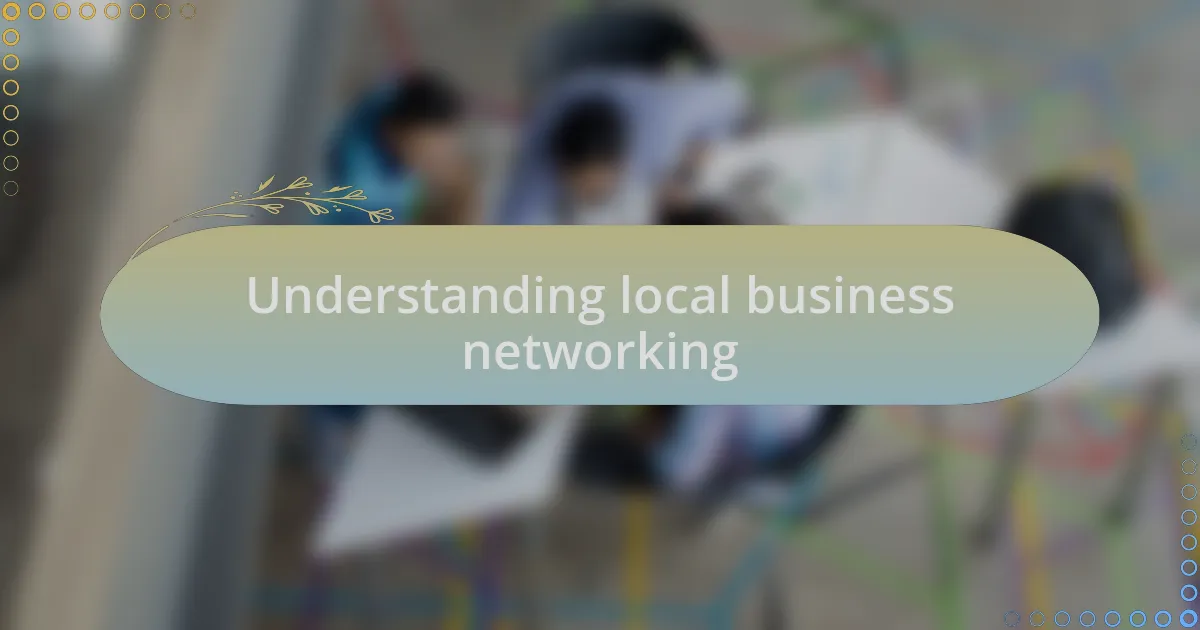
Understanding local business networking
Local business networking is more than just exchanging business cards; it’s about building genuine relationships that can lead to valuable opportunities. I still remember my first networking event, where I felt a mix of excitement and nervousness. As I connected with fellow entrepreneurs, I realized that each conversation was a chance to share insights and learn from one another. Don’t you think it’s fascinating how a simple chat can open doors to potential collaborations?
Many people underestimate the power of local networks, assuming they are too small to make a significant impact. However, I’ve discovered that local connections often yield the most profound advantages. For example, a referral from a local business acquaintance led me to a project that transformed my business trajectory. It made me wonder—how many opportunities are we missing by overlooking our immediate surroundings?
Each community has its unique vibe, and understanding that is essential to effective networking. I’ve learned to adapt my approach depending on the environment, whether I’m at a farmers’ market or a formal chamber of commerce event. Have you ever felt the energy in a room shift when you find common ground with someone? Those moments not only foster connection but also create an atmosphere ripe for collaboration and support.
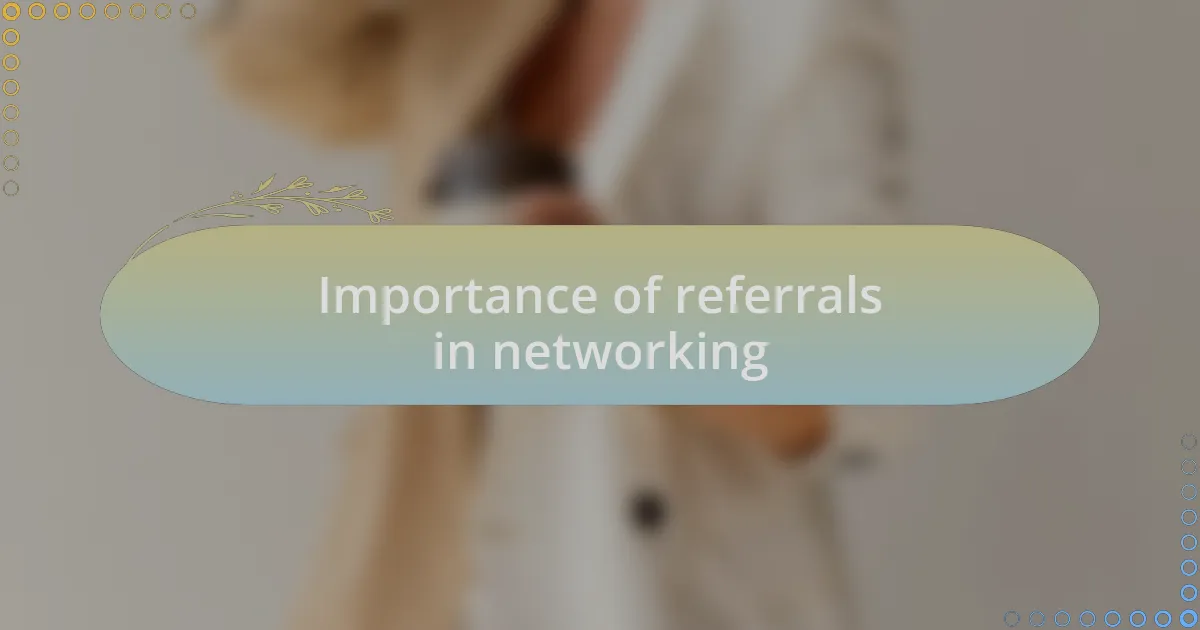
Importance of referrals in networking
When I think about the importance of referrals in networking, it’s hard to overstate their impact on fostering trust. For instance, I once referred a colleague to a potential client, and seeing them work together successfully made me appreciate the value of that connection even more. It’s interesting how a simple recommendation can carry the weight of experience, making people more comfortable in taking that leap of faith.
Emphasizing referrals has genuinely changed the way I approach networking. I remember meeting a business owner who shared a story about how a referral helped him land a significant contract that had seemed out of reach. Moments like that remind me that referrals create a ripple effect—they not only benefit the referred party but also elevate the referrer’s credibility in the community.
Trust is the cornerstone of any successful relationship, and referrals are the ultimate testament to that trust. Every time I receive a referral, it reinforces the connections I’ve built. This mutual support not only strengthens our networks but also cultivates a sense of belonging. Have you ever thought about how a referral could change the trajectory of someone’s path? Each referral opens doors to opportunities we may not even be aware exist.
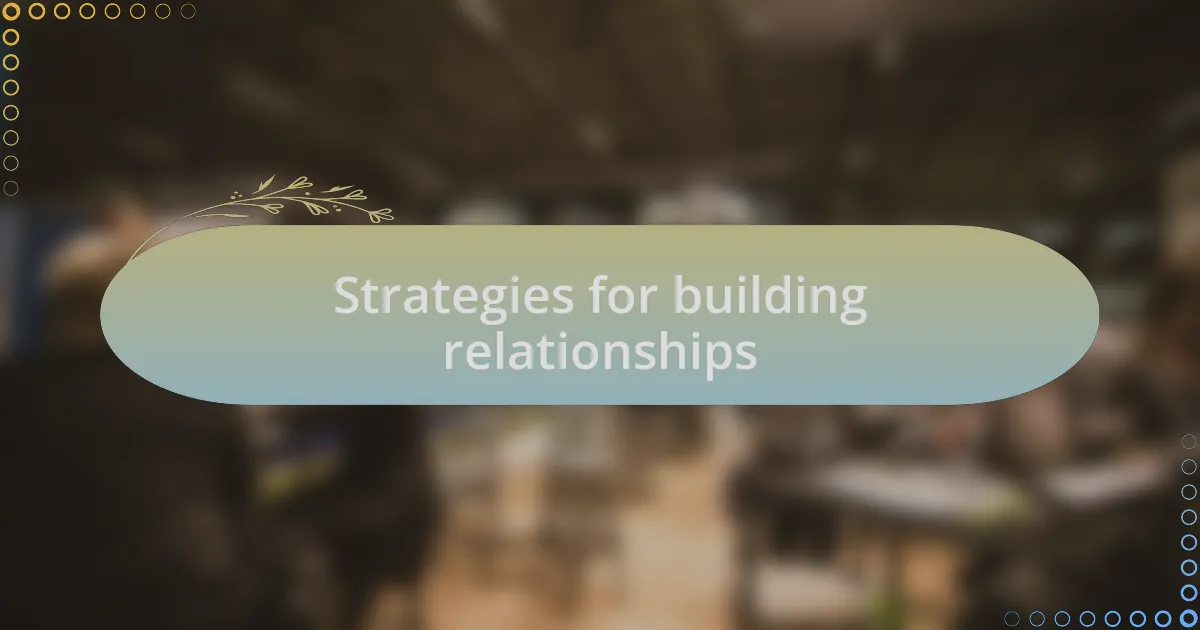
Strategies for building relationships
One effective strategy I’ve found for building relationships is to focus on active listening. During my early networking experiences, I often jumped into conversations with my own agenda, but I’ve learned that genuinely listening can create deeper connections. Have you ever noticed how people light up when they feel heard? It’s a simple but powerful way to foster trust and rapport.
Another approach I’ve used is to share personal stories when meeting new contacts. I recall a moment when I shared my journey of starting a local business, including the hurdles I faced. This vulnerability not only sparked meaningful conversations but also encouraged others to share their experiences. Isn’t it interesting how storytelling can turn a simple business meeting into a heartwarming exchange of ideas?
Lastly, I make it a point to follow up consistently after initial meetings. I remember reaching out to someone I met at a networking event a week later, thanking them for their insights. That small gesture turned into a fruitful collaboration down the line. Isn’t it fascinating how a quick message can reinforce a budding relationship? Taking that extra step can truly set you apart and strengthen those connections over time.
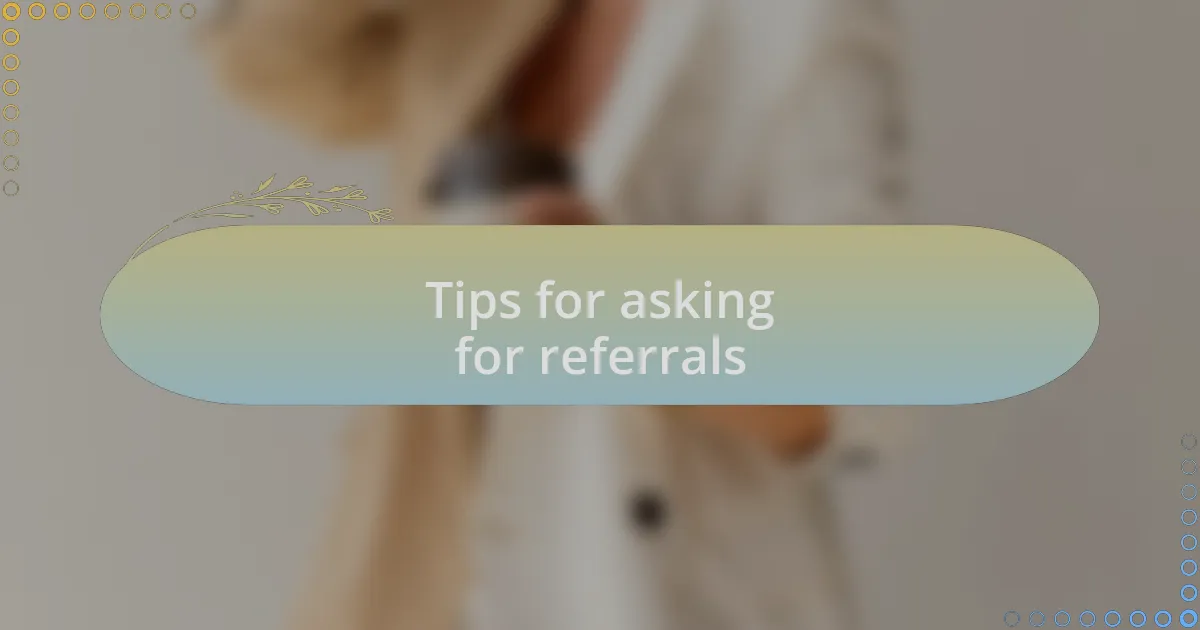
Tips for asking for referrals
When it comes to asking for referrals, timing is everything. I’ve learned that approaching someone after a successful collaboration can yield great results. For instance, after completing a project where my client expressed satisfaction, I felt confident asking if they could recommend me to others. The genuine appreciation in their eyes made it easy for them to say yes, reinforcing the idea that a job well done speaks volumes.
Another tip that works for me is to be specific in my request. Instead of simply asking for referrals, I try to suggest the type of connections I’m looking for. I remember once saying, “If you know any other local businesses that could benefit from my services, I’d really appreciate an introduction.” This clarity helps my contacts envision who might be a good fit, making them more likely to take action. Don’t you think having a clear target enhances the chances of getting a meaningful connection?
Lastly, I emphasize gratitude in my conversations. When I receive a referral, I make it a point to thank the person profusely and keep them in the loop. A few months ago, a colleague referred me to a client without expecting anything in return. I followed up with a heartfelt note and shared how the referral turned into a successful partnership. Recognizing their contribution not only reinforced our relationship but also encouraged them to refer others in the future. Isn’t it fascinating how appreciation can create a ripple effect in networking?
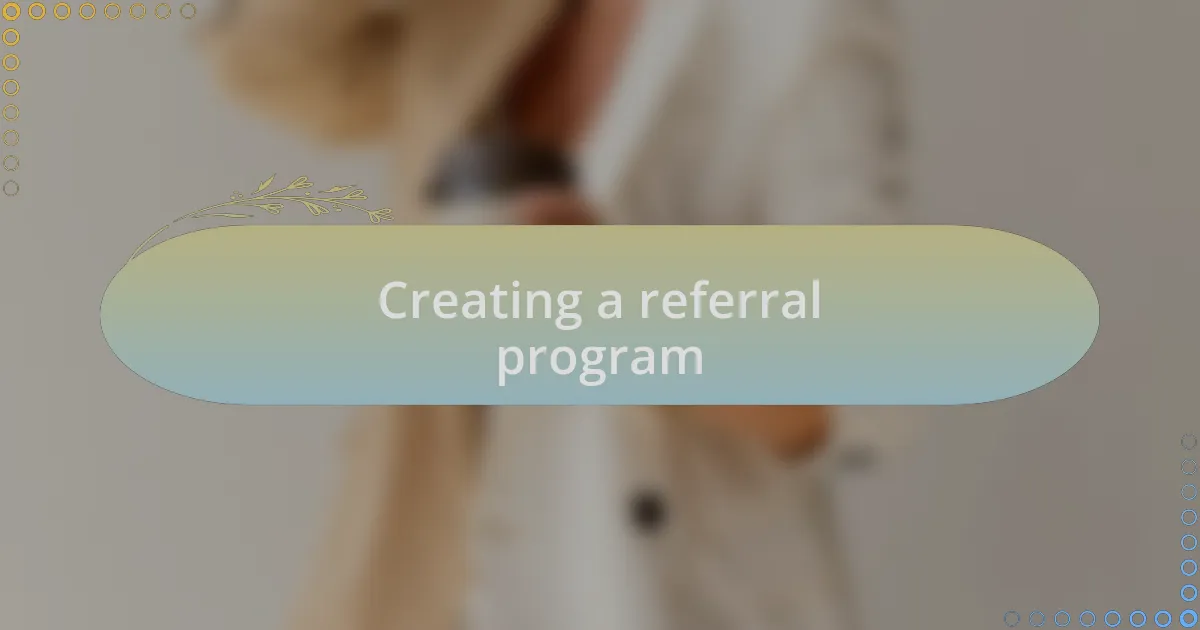
Creating a referral program
Creating a referral program can be a game-changer for any local business. I remember developing a simple yet effective program where I offered a discount to clients who referred new customers. The moment I launched it, I noticed an uptick in referrals, which made me realize that incentives can really motivate people to spread the word. Have you ever considered how a little reward could encourage your network to be more proactive on your behalf?
I also learned that clearly defining the criteria for the referral program increases its effectiveness. For instance, I made it a point to outline exactly what qualifies as a “successful referral” so my clients knew what to look for. By setting these parameters, I empowered my network to think strategically about who to connect me with. Isn’t it interesting how clarity can transform an abstract idea into a concrete strategy?
Another key aspect I found essential is communicating the impact of referrals. When I share success stories resulting from referrals, it inspires confidence in my program. For example, after a client referred a friend who turned into a valuable long-term customer, I shared that journey with everyone involved. This not only solidified my gratitude toward the referrer but also painted a vivid picture for others considering making a connection. Don’t you think showcasing the benefits can ignite a deeper interest in participating in your referral program?
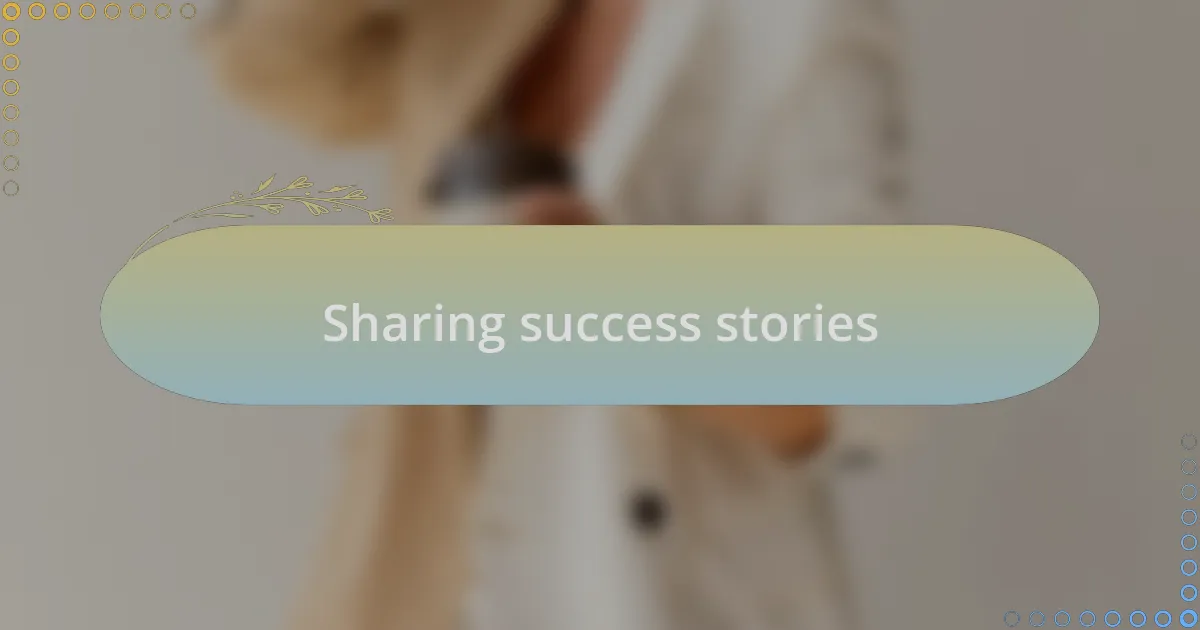
Sharing success stories
Sharing success stories has played a pivotal role in my networking journey. I remember one particularly powerful instance when a local café owner referred a client to me. That referral not only boosted my business but also helped the café owner by creating a collaborative atmosphere where we both flourished. Isn’t it amazing how one connection can ripple through a community, creating opportunities for many?
I often find that recounting these stories during networking events sparks genuine interest. Once, I shared how a successful project arose from a simple introduction. The energy in the room shifted as people leaned in, intrigued by the tangible outcomes of referrals. This shift reminded me that sharing specific success stories can ignite motivation and conversations, pushing others to think about how they can connect and collaborate meaningfully.
By spotlighting individual successes, I’ve also noticed that it deepens relationships with my network. Not just sharing the numbers, but the emotional journey behind those wins fosters trust. I recall thanking the referrer in a heartfelt email after their connection led to a rewarding project; their joy was palpable. How can we harness such feelings to encourage more referrals and deepen our local business connections?
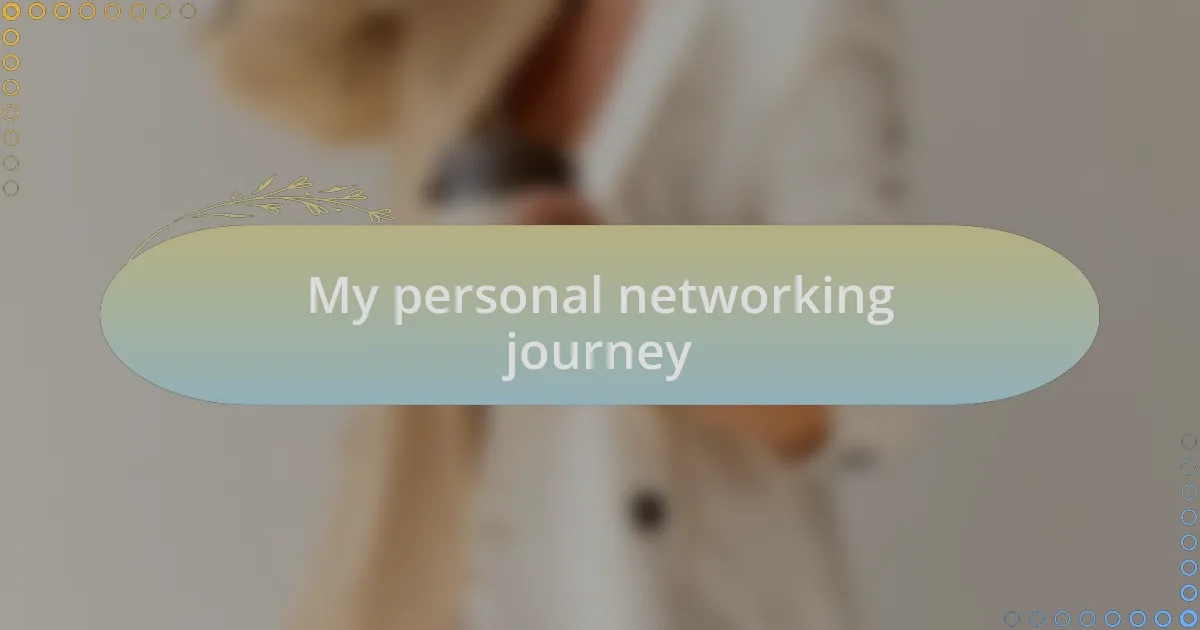
My personal networking journey
When I first set out on my networking journey, it felt a bit like stepping into the unknown. I vividly remember attending my first local business meet-up, feeling a mix of excitement and nerves. It was one conversation that changed everything for me—a friendly chat with a graphic designer led to a referral that grew into a long-term partnership. Can you imagine how a single interaction can transform the landscape of your business?
As I navigated these networking avenues, I noticed that authenticity played a huge role in my connections. At one gathering, I shared not just what I do, but why I do it—my passion for helping small businesses thrive. The moment I allowed my passion to shine through, I felt an instant connection with others. Have you ever experienced that moment when you realize you’re not just exchanging business cards but actually building relationships?
Over time, I came to understand that follow-ups are essential. I made it a habit to reach out after meetings, often recalling a shared moment or insight that resonated with both of us. One day, I emailed a fellow member about an idea we had discussed, and they responded with a referral that opened new doors for me. It was in those small gestures of maintaining connection that I found the greatest rewards. How have you kept the conversation going after initial meetings?